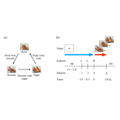Abstract
The present study develops an artificial agent that plays the iterative chicken game based on a computational model that describes human behavior in competitive social interactions in terms of fairness. The computational model we adopted in this study, named as the self-concept fairness model, decides the agent’s action according to the evaluation of fairness of both opponent and self. We implemented the artificial agent in a computer program with a set of parameters adjustable by researchers. These parameters allow researchers to determine the extent to which the agent behaves aggressively or cooperatively. To demonstrate the use of the proposed method for the investigation of human behavior, we performed an experiment in which human participants played the iterative chicken game against the artificial agent. Participants were divided into two groups, each being informed to play with either a person or the computer. The behavioral analysis results showed that the proposed method can induce changes in the behavioral pattern of human players by changing the agent’s behavioral pattern. Also, we found that participants tended to be more sensitive to fairness when they played with a human opponent than with a computer opponent. These results support that the artificial agent developed in this study will be useful to investigate human behavior in competitive social interactions.
